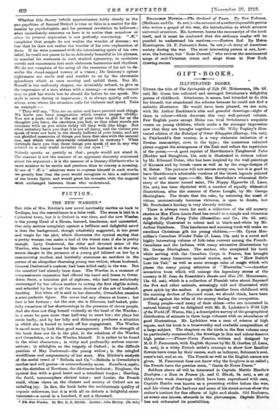FICTION.
THE NEW WARDEN.*
THE title of Mrs. Ritchie's new novel inevitably carries us back to Trollope, but the resemblance is a false trail. The scene is laid in a Cathedral town, but it is Oxford in war time, and the new Wasden, is the young Head of a House, learned, handsome, and unmarried. Our only serious complaint against a brilliant and delightful novel is that the background, though admirably suggested, is too great and tragio for the plot, which illustrates the cynical saying that a pretty woman can make a. fool of the wisest man if she is pretty enough. Lady Dashwood, the elder and devoted sister of the Warden, who keeps house for him while her husband is at the war, soents danger in the presence of a young girl billeted. on her by a manceuvring mother, and hurriedly summons an antidote in the- person of an altogether charming young war-widow, whose husband, General Dashavood's nephew, had been killed early in the war. But the misehief had already been done. The Warden in a moment of compassionate expansion had offered his hand and home to Gwen- dolen Scott, a brainless girl of eighteen, who had been sedulously encouraged by her odious mother to entrap the first eligible suitor, and schooled by her in all the mean devices of the arb of husband- hunting. But when all is said to her discredit, Gwendolen remains a semi-pathetic figure. She never had any chance at home ; her face is her fortune ; for the rest, she is illiterate, half-baked, pain- fully conscious of her shortcomings in the presence of clever people. And she does not fling herself violently at the head of the Warden in a sense he goes more than half-way to meet her ; she plays her cards badly, and by her folly and dishonesty produces a situation in which she is forced to break off her engagement. The Warden is saved more by luck than good management. But the strength of the book does not lie in the plot, in the relations of the Warden and Gwendolen, or in the Warden himself. It is rather to be found in the other characters ; in witty and profoundly serious conver- sations ; in sidelights on the tragedy of Oxford ; in the difficult position of May Dashwood—the young widow ; in the mingled worldliness and magnanimity of her aunt. Mrs. Ritchie's analysis of the social creed of " Belinda and Co."—Belinda is Gwendolen'e mother and evil genius—is extraordinarily acute. Excellent, again, are the sketches of Boreham, the dilettante hedonist; Bingham, the cynical don with a good heart and a trenchant tongue ; Harding, the florid, commonplace clerical tutor ; and Louise, the French maid, whose views on the climate and society of Oxford are an unfailing joy. In fine, the book lacks the arehiteetenio quality of organic oolierenoe, but it is with all its defeots a delightful enter- tainment—a novel in a hundred, if not a thousand.
• The New Warden. By Mrs. D. G. Ritchie. London : John Murray. [7s. net.]










































 Previous page
Previous page